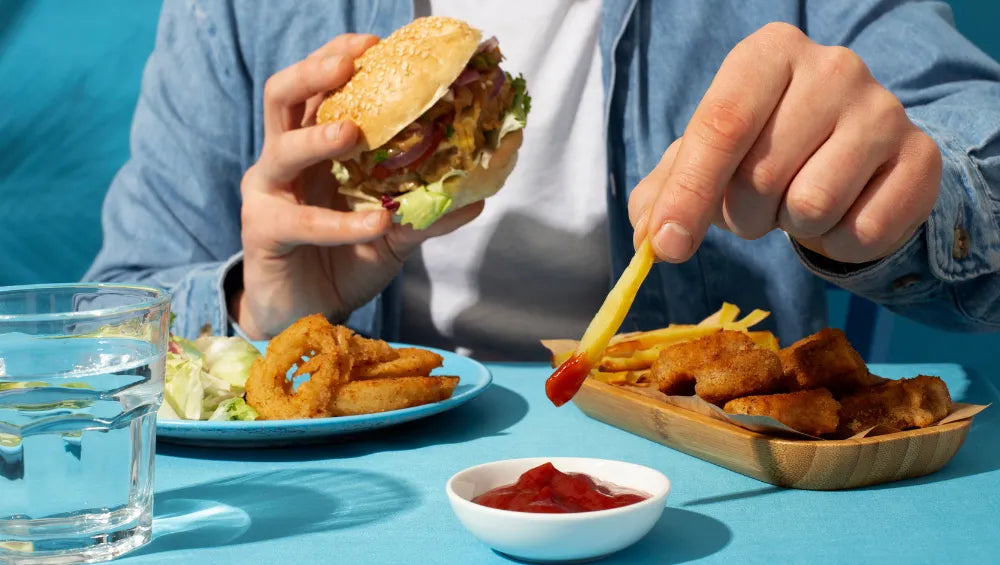Diets aimed at losing weight or improving body composition are often strict and repetitive, which can lead to frustration and irresistible urges to break away from healthy eating. The cheat meal , also known as a “cheat meal” or “treat meal,” offers a solution to reconcile the demands of a diet with satisfying taste buds. But does this practice have beneficial effects on our bodies, or is it simply a method that endorses poor eating habits?
What is a cheat meal?
The term cheat meal comes from English and literally means “ cheat meal .” It is a planned meal that takes a break from strictly adhering to the rules of a diet. These meals allow individuals to enjoy life's small pleasures without feeling guilty, while maintaining a regular rhythm in their nutritional program.
The goal of the cheat meal
It's important to understand that cheat meals aren't meant to undo all the effort you put into following a diet. Instead, they should be seen as a way to temporarily ease psychological and dietary constraints, thus promoting better long-term adherence to a balanced diet. In other words, the idea behind this practice is to create a taste break, allowing you to temporarily break away from the constraints of a strict diet without significantly affecting your results in achieving your goals, as long as you stick to the planned schedule.
Better understanding leptin
Leptin levels , a hormone responsible for feelings of fullness, can play a significant role in the success or failure of a diet. When the body lacks calories or essential macronutrients, leptin production decreases and feelings of hunger increase. A well-managed cheat meal can therefore help temporarily increase levels of this hormone and thus reduce hunger while following the diet.
The different approaches to cheat meals:
- The planned cheat meal: Setting a specific day for your cheat meal will give you a time frame and help you better manage your cravings during your diet.
- The unexpected cheat meal: Some people prefer to treat themselves to a treat meal on special occasions (family meals, birthday parties, outings with friends) rather than setting a regular date for their cheat meal.
- The “responsible” cheat meal: Opting for lower-calorie or processed foods and cooking your own cheat meal can help you combine taste pleasure with a balanced diet.
The potential benefits of the cheat meal
Although it may seem counterintuitive to some, there are several arguments that support the idea that eating a cheat meal can be beneficial as part of a weight loss or body composition improvement program, particularly for mood.
Prevention of food cravings
Constantly depriving yourself of your favorite foods while dieting can lead to low motivation and uncontrolled cravings. A cheat meal allows you to combat irresistible cravings without ruining your previous efforts.
Maintaining motivation over the long term
A diet that's too restrictive over a long period of time is difficult to maintain. This often leads to recurring setbacks and the return of bad eating habits. An occasional planned cheat meal helps strike a balance between necessary restrictions and guilty pleasures, making it easier to stick to the diet in the long run.
Positive stress management
Dieting and precisely controlling your food intake can be stressful. Allowing yourself a one-off cheat meal allows your mind to release the pressure and fully enjoy a guilt-free moment of indulgence. This helps maintain a strong mental state.
Stimulation of metabolism
Some suggest that the occasional increase in calorie intake could cause a slight boost in thermogenesis, thus promoting the expenditure of stored energy and possibly weight loss.
The potential drawbacks of the cheat meal
However, one must also consider the negative aspects associated with introducing a cheat meal into one's diet.
Risk of exaggeration and overconsumption
One of the dangers of cheat meals lies in the temptation to take the idea of "cheating" too far. Some people risk overindulging and consuming excessive amounts of fat, carbohydrates, and poor-quality nutrients all at once. Portions must therefore be carefully determined to limit excesses.
Possibility to compensate more than necessary
Over-relying on cheat meals as a way to temporarily escape the constraints of a diet can lead to the reinforcement of absolutely every forbidden pleasure. It's important to maintain a moderate approach so as not to disrupt the efforts made during a balanced diet.
Harmful psychological impact on some individuals
It's also possible that some people perceive cheat meals as an excuse to abandon their dietary discipline. This misperception can lead to feelings of guilt and failure, and even lead to abandoning the diet.
Impact on health
Foods often consumed during cheat meals (fatty, sugary, salty) can have negative impacts on health such as increased cholesterol or insulin resistance.
Disruption of dietary balance
Eating a cheat meal too frequently can cause a nutritional imbalance leading to a slowed metabolism and weight gain.
Precautions to take
To eat and enjoy yourself without feeling guilty, you must:
- Set your limits: Some people are more likely to lose control during a cheat meal and should therefore define in advance the portions and foods they will consume.
- Favor a balanced approach: If you opt for a cheat meal, be careful not to completely neglect nutritional intake. For example, favor lean sources of protein and accompany your meal with a variety of vegetables.
- Avoid extremes: Keep in mind that the cheat meal is meant to be an occasional interlude in your diet and should not systematically turn into a food orgy.
- It's better to opt for a full meal plan rather than a whole day dedicated to guilty pleasures. This will avoid disrupting the progress our bodies have made during the rest of the week.
- Carefully plan the timing of the cheat meal , based on the duration and nature of the diet being followed, as well as the specific needs of each individual. A cheat meal can be breakfast, lunch, or dinner.
Cheat meal: In summary
In short, the cheat meal divides opinions regarding its real benefits in terms of weight loss or a balanced diet. The arguments put forward by its proponents are far from unfounded, and it seems clear that this approach can help some people better manage their diet and persevere in the long term. However, the cheat meal is not suitable for everyone, and it is important to carefully assess your own needs and goals before incorporating it into your eating plan.








